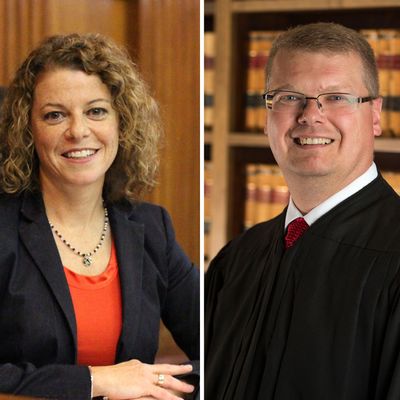
Scott Walker’s fight with his state’s judiciary over his efforts to avoid two state legislative special elections — which he has now abandoned — hasn’t been the only Wisconsin news involving judges or elections. Next Tuesday voters will decide a contest for a position on the state’s Supreme Court, and it looks to be an unlikely barnburner.
It’s actually a regular, not a special, election, despite its isolated timing; the state’s judicial elections have their own timetable. It’s also not technically a partisan battle; it’s officially a nonpartisan race in this hyperpartisan state. And the outcome won’t even fundamentally change the ideological balance on the Supreme Court: a win by center-left circuit court judge and former prosecutor Rebecca Dallet over conservative activist turned lawyer and judge Michael Screnock would simply reduce the court’s conservative majority from 5–2 to 4–3.
But this is Wisconsin, ground zero for partisan polarization, so even this election is a cage match. It was set up by a primary contest on February 20 that mostly served to eliminate a third, more liberal candidate (Tim Burns). At stake is a ten-year term on the court; the current occupant, conservative Michael Gableman, declined to run for another term. Dallet’s campaign is viewed by her supporters as a waystation to a possible liberal majority on the court after the 2020 elections. They are playing chess, not checkers.
The Dallet/Screnock competition, as aired out in ads and a series of debates, has been pretty noisy for a judicial contest, albeit predictable: Screnock accuses Dallet of being a lefty zealot who wants to legislate from the bench, while Dallet accuses Screnock of being a puppet for the corporate groups closely aligned with Walker. Dallet probably made a mistake with remarks to donors in San Francisco saying she shared their “values,” but it’s unlikely that will matter to persuadable voters (if there are any) any more than Screnock’s two arrests back in 1989 for illegal protests at abortion clinics.
Both candidates are drawing significant support from “outside” organizations. Dallet has received contributions from Eric Holder’s National Democratic Redistricting Committee, and Holder himself has stumped for her. She’s also gotten some support from For Our Future PAC, a group formed by billionaire Tom Steyer in conjunction with major unions. Screnock is being backed by the NRA and the state and national business lobbies who are strongly supporting the Wisconsin GOP’s assaults on unions, state employees, and voting rights. The Koch-affiliated Americans for Prosperity has been working to turn out the conservative vote in the race.
It’s hard to say which candidate has the advantage. Republicans have been over-performing in Wisconsin in recent years, as reflected in Scott Walker’s serial wins and the upsets pulled in 2016 by Senator Ron Johnson and (of course) Donald Trump. But anti-Trump sentiment and Democratic enthusiasm could tilt the balance back towars Dallet. Screnock won 46 percent of the vote in the primary, but may struggle to get much of third-place finisher Tim Burns’s 18 percent (Dallet won 36 percent). Polling shows mostly indifference: A survey released earlier this month by the respected Marquette Law School polling outfit showed that 81 percent of voters didn’t know enough about Screnock to form a clear opinion of him; 77 percent didn’t know squat about Dallet.
Turnout in recent Supreme Court elections in Wisconsin has averaged an abysmal 7.3 percent. So Tuesday’s contest is above all a statewide tune-up for the voter mobilization efforts both parties intend to deploy in November, when both Scott Walker and Democratic senator Tammy Baldwin will be on the ballot. It’s a big deal for the court itself and for the lawyers and interest groups with business before it. But for political people, it’s just another skirmish in one of America’s most intense partisan wars.






























